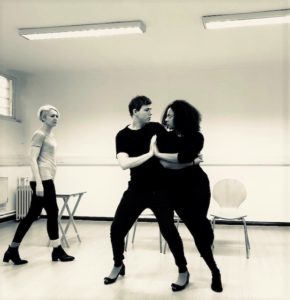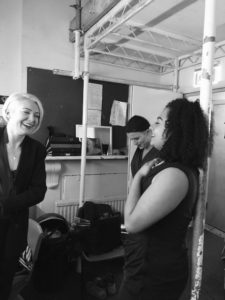In this guest post, Joanne Fitzgerald discusses the steps she took to produce her own script, and the lessons she learnt along the way.
In September 2017, the long list for the Bruntwood prize was released, and I remember the feeling of disbelief when I spotted my play Her Not Him. I double-checked. I triple-checked. But there it was.
It was an amazing feeling after spending the best part of 2 years working on the script in various guises, sending it into different competitions, getting friends to read it, reworking, tweaking, redrafting, until it was shaped enough that I felt ready to share it.
But a long-listing was no guarantee that it would ever see the light of day. If I wanted it performed I was going to have to organise it myself and take on the producer role.
Perhaps you’re itching to see your script brought to life and are considering taking on the producer role. For all you potential first-time producers, here’s my guide on how it can be done:
1. Arrange a workshop
First things first I had to test the script out. What I needed was a director and actors to get it on its feet and figure out how to tell the story physically.
I was very lucky to have been an actor for a brief spell and, through actor friends, I met my director, Amy Lawrence. We then went through the process of casting (using Mandy.com), while I also organised some rehearsal space and a venue.

For this, I used a site called www.rehearsalspacefinder.com that lists places by price and location, but there are plenty of other options worth exploring – schools, church halls and pub function rooms can all be workable and cheaper options.
Hearing actors read the text gave me the opportunity to adapt wording, edit scenes that went on too long, and add in new and interesting details based on discussions in the room.
But this time in the rehearsal room isn’t just about reading the script, it’s also the chance to play games, improvise backstories, and build a structure together, which leads us nicely onto…
2. Building a Team
I found most of our cast and crew through a combination of friends, recommendations from friends, Facebook groups, and mandy.com.
When creating this team, it’s important to be clear on what people’s roles are and make sure you each understand your own responsibilities.
This sounds very obvious but I had never worked with a professional producer so I didn’t really know what a good one was supposed to do, I just assumed it was a bit of everything.
I had also never worked with a stage manager or a set designer so I had to figure out what those roles were and trust those people to do their job. The key to that is to always communicate rather than assume.
And ask questions, even if you’re worried you’ll look stupid – pride in this context is a waste of time. It’s better to speak up and get a better understanding of what’s needed.
Also, if you value your sanity, don’t take everything on yourself. Build up a team of people you like working with, who are good at what they do and trust them to do their best – and they will.

3. Find a venue
So one of the useful things about doing a workshop is holding an informal showcase at the end to show what you’ve come up with. In our case, after a week’s work we had a decent 40 minutes to present.
I wrote to a list of theatres and production companies, inviting artistic directors, literary departments and programmers to come and see our piece and give us a little feedback on its potential to be programmed at their venues.
According to the law of averages, I invited people from about 30 different theatres in London, and 3 turned up. But they gave brilliant feedback!
I would also encourage scouring Twitter for opportunities that come up as it was a call-out for scripts from female writers that led us to getting a slot at Theatre503.
So, by the end of that workshop on the 15th December, I was armed with pages of notes and feedback, a new ending to write, and a week-long run at Theatre503 secured for the end of January.
4. Plan Plan Plan
I’m a project manager, so planning is my forte which, luckily, comes in handy for producing. Here’s my step-by-step breakdown for the built up to opening night…
6 weeks to go: I think this is the minimum point at which you should have a cast and director hired and meeting for the first time to do a readthrough, and a venue booked. It gives you, the writer, some time to tweak the script based on readthrough feedback and/or things you hear that make you cringe – before you start rehearsal properly; giving the cast enough time to learn any changes.
4 weeks to go (or earlier): Start of marketing blitz (at this point all reviewers and industry invites should also be sent)
2 weeks to go: Rehearsals. Ideally, these would be longer than 2 weeks, but this is a point where it would be helpful to do a run in front of someone who can give you a bit of feedback ahead of performance
1 week to go: Agree the Get In plan – who’s doing what, how long have you got to set up lights, sound, set, props & do a tech run/cue to cue with the actors
And before you know it, it’s showtime!

5. Be in control of performance week
In terms of the week where the actual performance(s) is/are happening, it needs to include the following:
- Opening night (when things will probably go wrong but it will all come together somehow)
- Press night (invite reviewers but not to opening night if you can help it, give the show some time to settle)
- Last night (let yourself enjoy it and recognise what you’ve accomplished)
- Get out (pitch in, don’t just leave it to the stage manager!)
- Write your thank you’s (you’ll have invited all your friends and family and colleagues and taxi drivers and literally anyone you meet in the run up – thank them for their support!)
I learned that for all my plans, things will inevitably go wrong. They just will. On Her Not Him we had at least one crisis a day in the 2-week lead-up to performance.
Set didn’t arrive on time, rehearsal room being evacuated, get-in times and people’s availability changing, flooring being the wrong size, actors getting sick – you name it.
And all you want to do is cry and retreat or shout and swear; but you can’t do any of that because none of it will help. You may have the moments of despair in the loo but then you quickly wash your face and move on because people are looking to you for some kind of leadership.
And actually it is in those panicky moments that some of the most creative solutions can be pulled out of nowhere and save the day.
6. Time to market it
Having a media campaign planned out in advance really helps. Amy, my director, and I came up with a list of things to post every day on Facebook and Twitter in the month running up to the show.
Posts included discussing the themes of the play, how the production was progressing, photos of cast and crew, promoting the theatre, and pushing ticket sales.
Prepare log lines, synopses and summaries that fit into a max of 120 characters. These can be used on socials/websites/email but also the all-important one liner is needed for every person you meet to entice them to come and see it.
As one PR person told us: ‘That can be said in time it takes for your listener to knock back their drink and make their excuses.’
7. Make sure your team are okay
Make sure actors are happy and calm and given enough time for arriving, warming up, getting to do make-up and into costume, and have a bit of dressing-room gossip.
The last thing you need is actor that are stressed or nervous going on stage. But this goes for everyone else too – your director, your stage manager, the box office and the ushers.
Check in with people and hear how they’re doing, how they think it’s going and listen to them. You also want everyone to feel that they can approach you with any issues and know that they will be heard.
Don’t bring any production woes to them, they don’t need hear it. You might be a stress-bunny in private but you’re the captain of the ship, and they’ll take their cues from you on behaviours; if you’re respectful and professional, they will be too.
8. Remember reviews aren’t gospel!
Don’t take reviews personally. I cried when I read the first few that weren’t stellar and took it as a personal failure that the show hadn’t been received with glowing praise and theatres fighting to bring us to Edinburgh.
As producer you need to consider the piece critically, and assess reviews for feedback that might help to improve the piece or that you can learn from for the next production.
And, as much as you might want to avoid reading them, it is the producer’s job to scan the reviews for any useable quotes to put into your marketing, so try to look at them from a purely functional perspective.

9. Next Steps
As soon as the first performance is over everyone asks: ‘What next?’
It would have been useful to have a clearer plan so that when this was asked, I could have said something specific and taken advantage of post-show enthusiasm to ask for donations or other support.
But I think the important lesson I learned was to be positive about the future. Now that I’ve done it, I can do it again. I know to expect things to go wrong, and that it’s okay if not everyone loves the piece.
I’ve worked with some brilliant people and did what I set out to do – get my first play performed.
Now on to the next one.




Congratulations on getting your show staged, Joanne. I admire your initiative and wish you good luck with the next one. But I’m still wondering about the cost. Did you fund it yourself? Did you pay your team, and if so how much? Or was it a profit-share arrangement? Such questions are crucial for most writers thinking of producing their own show.
Yeah I agree with Tom – great piece -brilliant you took the leap to produce your own play. Getting plays on is very difficult – in London – much harder – so very we’ll done.
However getting a play to stage has many complexities trials tribulations etc etc with funding – but without funding – phew – different level altogether. It would be interesting to know if your project was funded or not – I assume it was. 1st job of a producer in my experience is money – sourcing it – applying for it – then budget management- that would be a vital addition to this piece – for anyone wanting to undertake putting a play on.
I’ve only ever produced a play without money – done most things alone – pulled in favours – found highly committed cast from those I’d coached or collaborated with before – everyone has to make huge sacrifices – I was the writer, producer, actor, composer, sound designer, driver, organiser, workshop leader, theatre finder, marketing etc etc – I had to do all this because I had no money to pay others. I tried to source funding from many quarters but was unsuccessful. I found a brilliant director who again has made huge sacrifices to get my play on.
We have three nights at The Courtyard Theatre in under two weeks time. It’s been a long road – but I assume a different experience with funding to one without it.
Or maybe it’s more complex when there is money involved – be interested to know x
DG
Interesting piece. Only thing I wondered is if you was given a slot at Theatre 503 then that must have meant you didn’t need to find a venue. Did you have to pay to hire the place etc or was it all included as part of being selected?
Different article if it was, the venue cost and staff cost, bar cost for the night would mean a sizeable outlay.